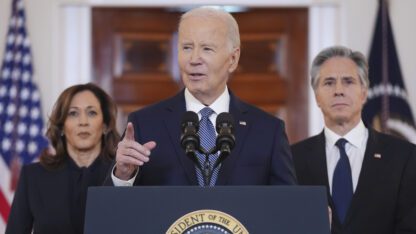Low-income parents and legal guardians of children up to age 6 in Georgia would be eligible for the state’s Pathways to Coverage program under a new proposal unveiled by Republican Gov. Brian Kemp at the Gold Dome on Wednesday.
Kemp’s signature Pathways to Coverage program launched in 2023. It offers Medicaid health insurance to able-bodied adults who would otherwise not qualify for traditional Medicaid.
To be covered, participants can earn up to no more than 100% of the Federal Poverty Level, $15,060 for a single individual and $31,200 for a family of four.
They must also document 80 hours per month of work, volunteering, education or other approved activities.
Under Kemp’s proposed changes to the program, which would need federal approval under a waiver from the incoming Trump administration, eligible parents and legal guardians would not have to meet the additional 80 hours of work currently required by Pathways.
“With today’s announcement, we are not only keeping families healthy together during a critical time of development, but also making an important investment in our state’s future,” Kemp said at a press conference with Lt. Gov. Burt Jones, Speaker of the House Jon Burns, state Insurance Commissioner John King, health care officials, and around two dozen mostly Republican state lawmakers.
Pathways is the only Medicaid program in the United States with a work or activity requirement.
After initial approval from the Trump administration, the Biden administration rescinded approval for the work requirement in 2021. It was subsequently reinstated after a state lawsuit. Georgia sued the administration again over Pathways’ delayed implementation.
Now, without federal action, Pathways is set to expire Sept. 30, 2025.
At the Capitol event, Kemp said he plans to include his proposed caregiver changes in the state’s upcoming application to extend Pathways after September. The state is expected to apply for renewal this spring.
“That’s the great opportunity we now have as a state,” Kemp said. “With the second Trump administration in Washington, we will have a federal partner that wants to innovate, efficiently use taxpayer dollars, and ultimately deliver better care to the American people.”
Advocates have long pushed for Pathways to also include eligibility for caregivers of older adults or family members with disabilities.
A spokesperson for Kemp declined to comment on whether this population could be added to the program in the future.
“We’re always looking for ways to streamline the program and make it more accessible. What that exactly looks like, we’ll continue to work with the General Assembly on it,” a spokesman for Kemp said after the event.
In a statement after Kemp’s announcement, Senate Democrats said Kemp’s changes don’t go far enough, calling Pathways, “steeped in waste and mismanagement.”
Citing previous reports, including one by policy organization KFF that found Pathways has “cost tens of millions in federal and state dollars on administration and consulting fees” while continuing to leave hundreds of thousands of Georgians uninsured, Senate Democrats say they plan to continue to push for Georgia to fully expand Medicaid under the Affordable Care Act.
Full expansion under the ACA would cover uninsured Georgians with incomes up to 138% of the federal poverty line.
“This common-sense policy would benefit the uninsured, and Georgia’s economy is predicted to grow by $9.4 billion in economic output in the first three years following expansion,” Senate Democrats’ statement reads.
In its first year, Pathways saw sluggish enrollment, with just over 4,300 participants –– far lower than the tens of thousands state officials had initially promised.
The Kemp administration said in a statement that the program has so far provided coverage to 8,385 Georgians.
“Increasing access to quality, affordable health care for every Georgian, regardless of zip code, has been, and will continue to be, a top priority for the Georgia House,” said Burns. “We are proud to support Gov. Kemp’s expanded eligibility criteria for the Georgia Pathways Program, which places an increased emphasis on providing a family-focused approach to health care.”
Kemp’s announced Medicaid changes also include another extension of coverage for postpartum women, continuing Medicaid coverage beyond one year postpartum, and coverage to eligible new fathers.
Under existing state rules enacted last year, Medicaid covers low-income Georgians during pregnancy and up to 12 months after delivery.
Kemp also announced new funding for maternal health and maternal mortality prevention efforts.
They include nearly $3 million to expand the Department of Public Health’s Perinatal Home Visit Pilot Program to a total of 75 counties across the state, as well $778,000 in new funding to expand cardiovascular and high-risk maternal health care services at designated perinatal centers in the state.








